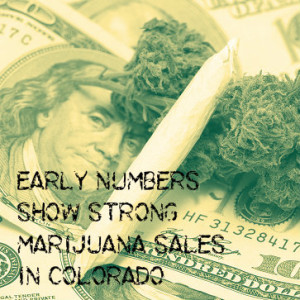On Jan. 1, 2014, legal recreational marijuana sales began in Colorado, with remarkably little fuss. Long lines appeared at the 37 stores across the state—mostly in the Denver area—that were fully licensed in time for the New Year, but any worries that the crowds might become disorderly proved to be unfounded.
Law enforcement was a major presence around the newly licensed establishments throughout the day to ensure that the crowds did not get out of hand, and to check the establishments for compliance. Stores selling marijuana must check IDs to ensure each customer is 21 years of age or older, and to determine each customer’s state of residence. Under the new laws, Colorado residents are permitted to buy up to one ounce of marijuana, while out-of-state customers are permitted to buy up to one-quarter of an ounce.
Setting The Precedent Of Legalizing Marijuana
 Colorado is not just the first U.S. state to legalize the sale of recreational marijuana—it is the first state or city anywhere in the world to open stores officially licensed to sell recreational marijuana. Both Colorado and Washington voted to legalize marijuana in the November elections of 2012, but Washington stores will not begin selling recreational marijuana until later in 2014.
Colorado is not just the first U.S. state to legalize the sale of recreational marijuana—it is the first state or city anywhere in the world to open stores officially licensed to sell recreational marijuana. Both Colorado and Washington voted to legalize marijuana in the November elections of 2012, but Washington stores will not begin selling recreational marijuana until later in 2014.
As the months and years pass, Colorado will be the vanguard in other ways as well. The rest of the U.S. will be looking to Colorado to evaluate the success of the state’s regulatory measures that are designed to restrict marijuana sales to licensed establishments, and restrict marijuana purchases to people of legal age. Federal and state officials will be watching to see what effects marijuana legalization has on marijuana abuse and dependence, on underage use of marijuana and on the suddenly legitimate marijuana industry.
Some opponents of the legalization of marijuana fear that the marijuana industry could become a second “Big Tobacco”—an industry that earns huge profits by causing people to become addicted to their products.
Legalized Marijuana Prices
On Jan. 1st, most stores were charging $30 to $50 for an eighth of an ounce of marijuana, although some were charging slightly more. This is significantly higher than the price of legal marijuana in Colorado at the more than 300 dispensaries licensed to sell marijuana for medical purposes to people with a prescription.
Some stores had raised their prices for opening day, and others limited purchases to smaller amounts than the law’s limit for fear of running out of stock. Average prices may drop after the first months of sales and as the stores react to the market. However, legal buyers will still have to deal with an expense that has never before factored into recreational marijuana sales: taxes. Colorado has placed a 15 percent excise tax and a 10 percent sales tax on marijuana purchases, for a total of 25 percent of the cost of the purchase.
Some early customers did express dismay over the prices, and compared them negatively to the cost of purchasing marijuana from non-licensed sources. Even so, sales at the 37 stores across Colorado totaled more than $1 million on New Year’s Day alone, and more than $5 million in the first week.
Colorado has estimated that the marijuana industry could generate around $600 million in sales per year. The state expects to collect around $70 million in taxes from these sales.
Unique Challenges For Marijuana Retailers
While the new marijuana retailers were buoyed by the early sales, there are still many challenges for those in the legal marijuana business. Although the U.S. Department of Justice has decided not to interfere with recreational marijuana sales in Colorado and Washington, these retailers are still impacted by the federal ban on recreational marijuana sales.
Marijuana retailers are not able to get traditional services from banks (who fear criminal proceedings for money laundering), and do not qualify for federal tax write-offs that assist many small business. Furthermore, many establishments are limited to cash transactions because they are not able to accept credit cards. This can make them more vulnerable to robbery, and can make it more challenging to file taxes and manage the employee payroll.
Learn About The Pros And Cons Of Legalizing Marijuana


